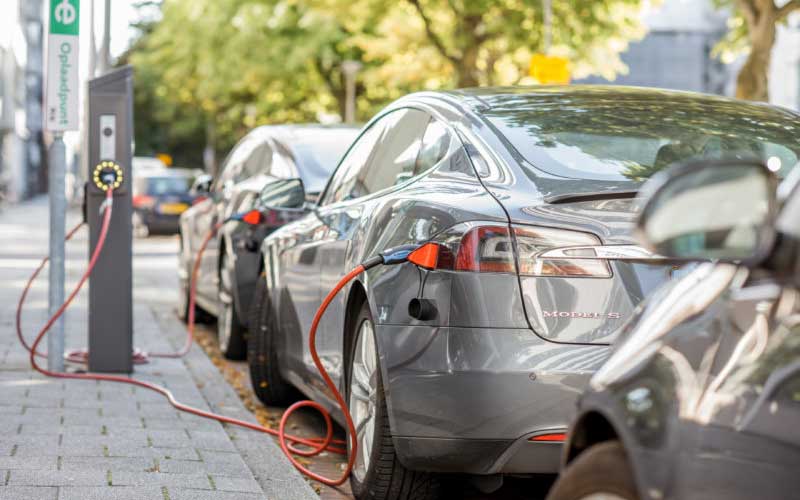
Electric vehicles are a critical part of our climate solutions – which is why making charging stations more widespread is so important. Photo: Shutterstock.
It’s time to celebrate a climate win, New Hampshire. The state Public Utilities Commission has approved an Eversource plan that will make it easier for residents to buy and charge an electric car.
There’s a reason I’m particularly excited about this win. Transportation is the largest source of polluting emissions in the entire country. And the toxins that spew out of tailpipes not only damage the climate, but also dirty the air we breathe. Electric vehicles, when powered by clean energy like solar and wind, can cut down on these pollutants – making for a healthier climate and cleaner air.
CLF played a critical role in seeing this plan over the finish line, working with Eversource and other parties to refine the plan into one that the State would approve. CLF pushed Eversource to increase its rate design so that all Eversource customers’ fast-charging electric vehicle stations would be eligible. CLF also advocated for the proposal at a Commission hearing. And we helped get other parties on board with the plan. These additional supporters ultimately led to the Commission approving the plan. It’s the kind of behind-the-scenes work that doesn’t necessarily make headlines but that uses our policy expertise to craft critical victories for our climate.
Let’s look at how Eversource’s plan will help pave the way for electric vehicles in New Hampshire.
Making Electric Vehicle Charging Stations Easier to Install
It’s clear we need to ditch gas-guzzling cars to cut climate-damaging emissions. But with electric vehicles, we contend with a sort of chicken-and-egg scenario. Which comes first: charging infrastructure or more electric vehicle purchases by residents?
The Eversource plan takes aim at the charging infrastructure side of the equation, committing the utility to spend $2.1 million to help build it out in the state. Ultimately, the plan aims to lower costs for business customers that install public charging stations. To achieve those lower costs, the plan targets “demand charges”: an extra charge imposed on commercial or industrial customers for periods when their electricity consumption is higher than average.
Electric vehicle charging stations use a lot of power, which means high demand charges can rack up enough costs to comprise the bulk of a business’s monthly electricity bill. Because not many people have electric vehicles, these businesses must try to recover the costs of demand charges from a small pool of customers. These costs are a major disincentive for commercial or industrial customers to install public charging stations.
Eversource’s plan fully eliminates demand charges on fast-charging public electric vehicle charging stations for its customers. Now, its business and industrial customers won’t have to contend with this financial sacrifice to install one. Having more public charging stations makes owning an electric vehicle much more accessible – since, with widely available public stations, you won’t necessarily need to have a charging system at your own home or apartment.
The Eversource plan will also invest in helping build charging stations across the state and connecting them to the electricity grid. Such investments are critical to ensure reliable charging services. By doing so, Eversource is priming New Hampshire to launch a public charging station network.
Setting the Stage for Electric Vehicles in New Hampshire
The reality is, passing climate-friendly policy in New Hampshire is hard work. We’re the only state in the region that hasn’t passed a climate law requiring cuts in carbon pollution. And our state’s just-revised 10-Year Energy Plan relies far too much on subsidized fossil fuels, essentially ignoring the dictates of settled climate science.
But that doesn’t mean we’re not still fighting every day to end our state’s addiction to climate-damaging fuels. We are committed to creating a healthier future for our families in the Granite State and New England as a whole. Here in New Hampshire, that often means supporting, pushing, and cajoling state agencies to act. It’s work that happens out of the spotlight in proceedings that rely on arcane legal wonk and expertise – work that wouldn’t be possible without the support of our constituents and partners.
I’m hopeful about what our hard work achieving this recent win means for the climate fight in New Hampshire. We still have a lot more to do to make electric cars affordable and accessible to everyone – and to make our electricity grid one that runs on clean, renewable energy. So let’s take today to celebrate this win – because tomorrow we’ll be right back into the fight.



